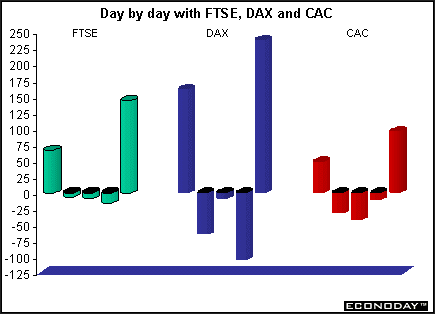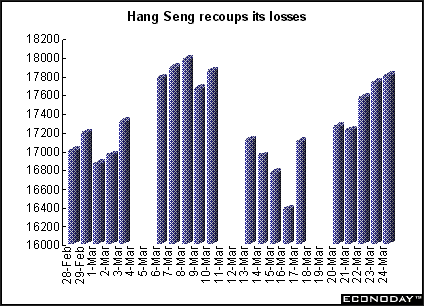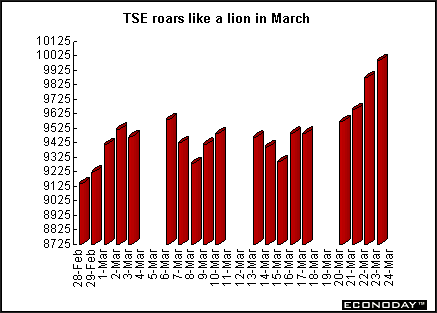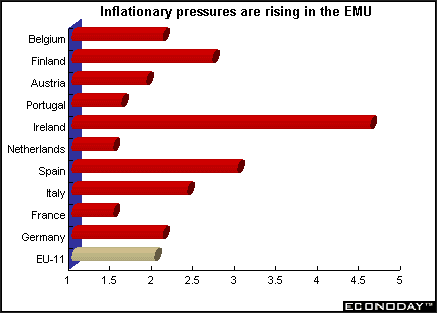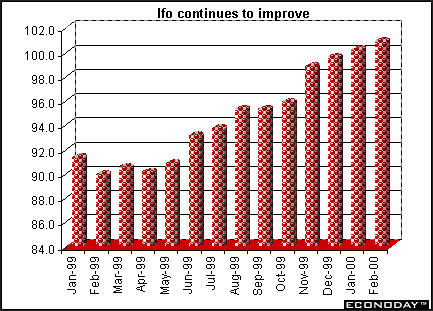| Previous Articles |
|
Equities
resume positive ways
Europe
and Britain
Not to be outdone, the Frankfurt DAX gained 2.9 per cent or 221.5 points to end the week at 7,932.42. The DAX, which was the more volatile of the European indexes last week, was able to comfortably recover the 104 points lost on Thursday. The market was buoyed by progress in the critical German labor negotiations. The Paris CAC turned in a respectable performance, climbing 0.95 percent or 60 points to end the week at 6364.26. As with all the indexes, the Nasdaq's turnaround stimulated interest in the technology sector again. All the markets were relieved that the Federal Reserve raised U.S. interest rates by only 25 basis points, an amount already factored into the markets. Asia After celebrating the vernal equinox Monday, Tokyo initially ignored solid Japanese economic data and focused nervously on the pending Federal Reserve interest rate increase. Despite the jitters, the Nikkei rose but chiefly on company specific news, especially any news dealing with fiscal year earnings.
Analysts said that investors were seeking to take profits in information technology issues following the recent recovery in that sector. Many Japanese companies sell shares before the year end book closing on March 31st in order to boost profits, otherwise known as window dressing. Traders also said that institutional investors were returning to the market, after avoiding opening positions in the past few sessions as they prepared to close their books for the year end. The Nikkei ended the week just under the elusive 20,000 mark at 19958.08, up 2 percent or 391.76 points. Hong Kong Hang Seng was also overcome by U.S. rate anxieties, giving up recent gains in anticipation of the FOMC's interest rate increase. Increased U.S. rates especially spill over into Hong Kong because the local currency is pegged to the dollar. Although the 25 basis point increase was widely expected, lingering concerns that the increase would be larger triggered a spate of selling in many interest rate sensitive stocks such as banks and real estate companies.
On the week the Hang Seng closed at 17784.57, soaring 701.58 points or 4.11 percent. This put the index back to where it was two weeks ago, before the heavy volatility prior to the Taiwan elections eroded the index. Americas
Currencies
The euro rose after Switzerland's National Bank surprised analysts and raised its target interest rate by 75 basis points. Analysts had expected an increase of between 25 and 50 basis points. While Switzerland hasn't adopted the euro, the move spurred expectations for higher rates in the single currency zone, which would make euro deposits more attractive. Analysts said that no other central bank has gotten a jump on the market like the Swiss have and investors respect that aggressive action. The yen fluctuated within a tight range last week. Although Japanese companies have completed their hedging needs for the fiscal year, which ends Friday, some exporters already are starting to hedge their receipts for the next quarter because of the dollar's gain against the yen. The U.S. stock and bond rally helped to support the dollar by increasing demand for dollars with which to purchase these securities.
The yen showed little reaction to the Bank of Japan's decision to keep its near zero interest rate policy. The Bank has kept the inter-bank overnight loan rate between 0.02 percent and 0.03 percent since March of last year because the economy has not been improving quickly enough to spur inflation. A lot of Japanese economic data will be released in the next few weeks and that should give investors a better perception about the economy's growth prospects. Central
Banks had busy week! As expected, the Federal Reserve raised both the federal funds rate and the discount rate by 25 basis points. The federal funds rate is now 6 percent and the discount rate is 5.75 percent. The Bank of Canada followed the Fed as expected and raised its policy making interest rate to 5.5 percent. This maintains the spread between U.S. and Canadian interest rates at 50 basis points.
The Swedish Riksbank left its policy making repurchase rate unchanged at 3.75 percent. In a statement accompanying the rate decision, the Riksbank said that its new inflation report projects that underlying Swedish inflation will be 1.6 percent in one year's time and 2.1 percent in two year's time. The central bank has an inflation target of 2 percent - plus or minus 1 percent - in the coming two years. The Swiss National Bank raised its three month Libor interest rate target range 75 basis points to 2.5 percent to 3.5 percent. The Bank acted because of growing inflation dangers from strong gross domestic product growth and the weak exchange rate of the Swiss franc against the dollar. The bank said it aimed to keep three month Swiss Libor rates in the middle of the target range. The SNB last raised its target range for the 3-month Libor by 50 basis points on February 3rd, immediately after the European Central Bank's increase. In December, the SNB switched its policy strategy from targeting money supply growth to targeting money market rates. The Bank of Greece, as expected, left its key 14 day deposit rate unchanged at 9.25 percent at its regular money market operation Wednesday. The Bank of Greece cut its deposit rate by 50 basis points on March 8th in a widely expected move to bring its key official rate closer to that of the European Central Bank in preparation for entry into European Monetary Union. The vote was unanimous at the Bank of England Monetary Policy Committee meeting on March 8th and 9th to leave the official repurchase rate unchanged at 6 percent. This despite the consensus view that there were a variety of factors pointing to higher inflationary pressures. The Bank of Japan's Monetary Policy Board left overall monetary policy unchanged after their meeting on Friday. The Hong Kong Association of Banks, as expected, raised its key deposits rate and 24 hour call rate by 25 basis points to 4.25 percent. Although not a central bank, banks will follow by raising their interest rates. With the Hong Kong dollar pegged to the U.S. dollar, Hong Kong banks generally follow U.S. interest rate moves. UK
sells more gold
Analysts were disappointed with the sale's results and cited three possible reasons for gold's recent weakness. The imminence of the Bank of England auction, worries that Brazil may have been selling gold, and confirmation from the Swiss National Bank that the closing date for objections to its plan to sell 1,300 tons of gold is April 20th. Demand at the auctions has varied from eight times the amount on offer to double. If the price moves up in the week before the sale, it has moved down in the week of the sale, and vice versa. But the main price moves in gold over the past year have been in response to policy statements. Indicator
scoreboard
January seasonally adjusted industrial output was unchanged after an unrevised 0.1 percent gain in December. The January and December results are well below the 0.8 percent gain posted in November and the 0.4 percent to 0.6 percent gains posted from August to October. It is unclear to what extent the December and January results were distorted by Y2K effects. When compared with last year, production rose 3.9 percent. Germany - February import prices jumped 1.7 percent and 10.9 percent when compared with last year. Excluding crude oil and petroleum products, import prices were up 0.9 percent on the month and 4.6 percent on the year. Crude oil import prices were up 10.9 percent on the month and 189.1 percent on the year, while petroleum product prices were up 8.7 percent and 163.2 percent, respectively. Seasonally adjusted German import prices rose 1.6 percent in February and were 11.0 percent higher when compared with last year. February seasonally adjusted export prices rose 0.3 percent in February from a month earlier and 2.6 percent on the year, after rising 0.2 percent on the month and 2.3 percent on the year in January. February's Ifo Institute west German business sentiment index rose to 100.9, the highest since November 1994. The strong increase was due solely to improved current conditions sentiment while business expectations sagged. The business sentiment index declined for the first time since February 1999, suggesting that the Ifo index may reach its peak in the near future. However at 108.7 in February, expectations remain high. The index for western Germany, which accounts for around 90 percent of the country's industrial output, rose for the sixth consecutive month. January manufacturing orders were revised down again, confirming that demand showed an unexpected slowdown at the turn of the year. Both domestic and foreign orders were down. January data must be interpreted with caution, since they may well represent only a normal correction from the strong increase in previous months because of skewed demand by the millennium change. February producer prices rose 0.2 percent on the month and 2.4 percent on the year - the highest level since March 1992. However, excluding mineral oil products, producer prices were unchanged on the month and up only 0.7 percent on the year, showing that price pressures during February came mainly from oil prices. Bundesbank seasonally adjusted data show that producer prices were up 0.3 percent in February and 2.4 percent when compared with last year. Italy - Fourth quarter gross domestic product rose 0.4 percent on the quarter and 2.1 percent when compared with last year. An inventory build up along with strong investment bolstered growth. Private consumption was up 0.6 percent, investment was up 1.3 percent and net trade was up 0.5 percent. January seasonally adjusted unemployment rate rose to 11.2 percent from October 1999 when the rate was 11.0 percent. However, it is down when compared to January 1999's 12.3 percent rate. Unemployment rose because fewer jobs in industry were available and a rising number of people were looking for work especially in the south, while employment in agriculture continued its downward trend. Britain -February retail prices excluding mortgages (RPIX) crept higher but still remained below the Bank of England's 2.5 percent inflation target for the 11th month in a row. RPIX rose 0.4 percent on the month and 2.2 percent on the year. February retail price index (RPI) rose 0.5 percent on the month and was up 2.3 percent on the year.
March manufacturing orders declined after four months of steady improvement, but output expectations for the next four months rose, according to the latest industrial trends survey published by the Confederation of British Industry. Manufacturers expect output to rise significantly over the next four months with expectations the highest since last September. Output expectations have been positive since the middle of last year. February trade deficit with countries outside the European Union narrowed sharply largely because of higher manufactured goods exports. The value of exports to non-EU countries rose 7.6 percent on the month while imports were down 1.8 percent. The drop in imports was concentrated in oil, intermediate and capital goods. The January global goods deficit also narrowed mainly because of a fall in the value of imports from EU countries. Asia February consumer price index dropped 5.1 percent when compared with last year. This was the 16th straight month that the index has fallen as aggressive retail price wars overshadowed higher fuel prices. Korea - Fourth quarter gross domestic product grew 2.8 percent and jumped 13.0 percent on the year. For 1999 as a whole, GDP rose 10.7 percent on the year, the best growth since 1988 and in contrast to 1998 when the economy contracted 6.7 percent. Private spending, capital investment and exports were major contributors to the growth. Japan - February trade surplus rose 26.8 percent from the previous month as both imports and exports rose. The surplus was up 18.0 percent from the previous month on a seasonally adjusted basis. The unadjusted surplus with the United States rose 66 percent on the year as exports rose 10.7 percent and imports declined 21.3 percent. Americas
January retail sales were unchanged from December. However, when compared with a year ago retail sales were up 6.7 percent. Strong gains in general merchandise and clothing stores offset large declines in other stores that may have had their December sales buoyed by millennial festivities or Y2K concerns. BOTTOM
LINE Looking Ahead: March 27 to March 31, 2000
|
|||||||||||||||||||||||||||||||||||||||||||||||||||||||||||||||||||||||||||||||||||||||||||||||||||||||||||||||||||||||||||||||||||||||||||||||||||||||||||||||||||||||||||||||||||||||||||||||||||||||||||||||||
